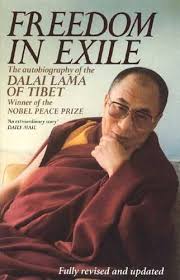Freedom In Exile: The Autobiography of the Dalai Lama of Tibet
In 1938 a two year old boy was recognised through a traditional process of discovery as being the reincarnation of all previous Dalai Lamas, the spiritual rulers of Tibet. Taken away from his parents, he was brought up in Lhasa according to a monastic regimen of rigorous austerity and in almost total isolation. Aged seven he was enthroned in the 1000-room Potala palace as the supreme spiritual leader of a nation the size of Western Europe, with population of six million. And at fifteen, he became head of state.
With Tibet under threat from the newly Communist Chinese, there followed a traumatic decade during which he became the confidant of both Chairman Mao and Jawaharal Nehru as he tried to maintain autonomy for his people. Then in 1959, he was finally forced into exile - followed by over 100,000 destitute refugees.
Here, in his own words, he describes what it was like to grow up revered as a deity among his people, reveals his innermost feelings about his role, and discusses the mysteries of Tibetan Buddhism.
Review
A touching book, that arouses great sympathy for its extraordiary author
From the supernatural marvels of Shangri-La to the life-and-death manoeverings of Realpolitik: an earnest, inspiring, and wholly captivating tale of spiritual adventure
The Dalai Lama's autobiography should leave no one in doubt of his humility and genuine compassion. Written without the slightest hint of pretence, the exiled leader of Tibet recounts his life, from the time he was whisked away from his home in 1939 at the age of four, to his escape from Tibet in 1959, to the winning of the Nobel Peace Prize in 1989. The backdrop of the story is the 1950 Chinese invasion of Tibet. We learn in calm detail of imprisonment, torture, rape, famine, ecological disaster and genocide that in under four decades of Chinese rule have left a million-and-a-quarter Tibetans dead and the Tibetan natural and religious landscapes decimated. Yet the Dalai Lama's story is strangely one of hope. This man who prays for four hours a day harbours no ill will toward the Chinese and sees the potential for good everywhere he casts his gaze. Someday, he hopes, all of Tibet will be a zone of peace and the world's largest nature preserve. Such optimism is not naive, but a result of his daily studies in Buddhist philosophy and his doctrine of Universal Responsibility. Inspiring in every way, Freedom in Exile is both a historical document and a fable of deepest trust in humanity.
With Tibet under threat from the newly Communist Chinese, there followed a traumatic decade during which he became the confidant of both Chairman Mao and Jawaharal Nehru as he tried to maintain autonomy for his people. Then in 1959, he was finally forced into exile - followed by over 100,000 destitute refugees.
Here, in his own words, he describes what it was like to grow up revered as a deity among his people, reveals his innermost feelings about his role, and discusses the mysteries of Tibetan Buddhism.
Review
A touching book, that arouses great sympathy for its extraordiary author
From the supernatural marvels of Shangri-La to the life-and-death manoeverings of Realpolitik: an earnest, inspiring, and wholly captivating tale of spiritual adventure
The Dalai Lama's autobiography should leave no one in doubt of his humility and genuine compassion. Written without the slightest hint of pretence, the exiled leader of Tibet recounts his life, from the time he was whisked away from his home in 1939 at the age of four, to his escape from Tibet in 1959, to the winning of the Nobel Peace Prize in 1989. The backdrop of the story is the 1950 Chinese invasion of Tibet. We learn in calm detail of imprisonment, torture, rape, famine, ecological disaster and genocide that in under four decades of Chinese rule have left a million-and-a-quarter Tibetans dead and the Tibetan natural and religious landscapes decimated. Yet the Dalai Lama's story is strangely one of hope. This man who prays for four hours a day harbours no ill will toward the Chinese and sees the potential for good everywhere he casts his gaze. Someday, he hopes, all of Tibet will be a zone of peace and the world's largest nature preserve. Such optimism is not naive, but a result of his daily studies in Buddhist philosophy and his doctrine of Universal Responsibility. Inspiring in every way, Freedom in Exile is both a historical document and a fable of deepest trust in humanity.
Top rated books in this category


































